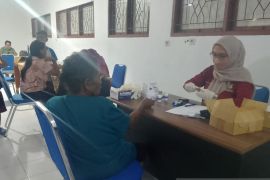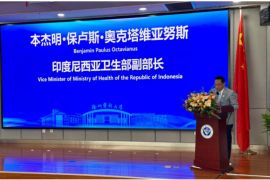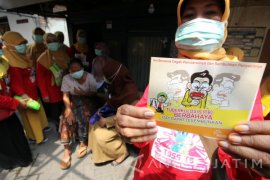If we look at it from a nutritionist perspective, giving good animal protein to children in two weeks can help their conditions return to normalJakarta (ANTARA) - Indonesian Health Minister Budi Gunadi Sadikin stated that stunting is commonly found in children aged six to 24 months or after exclusive breastfeeding by the mother ends.
"There are many other factors, but the one with the highest determinant, the highest risk factor, and the one that causes the highest (incidents of) stunting is the time when the mother is pregnant and the baby is between six and 24 months," he noted at a webinar titled, "Prevent Stunting, Prevent Infection in Children," in Jakarta, Thursday.
Sadikin remarked that the age of six to 24 months in children is a very vulnerable period during which time, a child's nutritional intake must be supported by the provision of Complementary Food Supplements (PMT).
When a mother has fulfilled her role of providing exclusive breastfeeding to a child up to six months, parents must realize that PMT can help the growth and development of children to be optimal, especially PMT with animal protein, Sadikin emphasized.
Animal protein can be found in eggs, fish, chicken, and meat. Unfortunately, information on nutritional intake has not been disseminated properly by parents at home.
According to the minister, nutrition experts suggest that nutritional interventions be started from the upstream. Intervention during the First 1,000 Days of Life (HPK) can prevent a child from stunting or correct the child's health condition.
The minister stated that only five percent of children affected by stunting were found to be able to recover, with a treatment that must be carried out in a hospital and costs up to millions of rupiah.
"If we look at it from a nutritionist perspective, giving good animal protein to children in two weeks can help their conditions return to normal. This intervention is cheaper than treatment. The budget is only Rp30 thousand to Rp40 thousand per day for two weeks to prevent stunting," he explained.
Apart from being prone to occurring in children aged six to 24 months, stunting is also a risk since the mother enters the pregnancy period, he stated.
Expectant mothers usually experience nutritional and iron deficiency, so their food intake cannot fulfill the needs of the fetus for optimal development, Sadikin pointed out.
Hence, he expressed optimism that pregnant women would start undergoing routine check-ups for their pregnancies for six months at the community health center (puskesmas) and at least twice for ultrasound examination. In the event of slow fetal growth, immediate intervention at a health center is necessary.
He also suggested regular intake of iron tablets for mothers to prevent anemia.
"If the fetus' growth is slow, it can lead to malnutrition, and we must conduct an intervention at the health center. Mother's health during pregnancy will determine whether the baby will be born with stunting or not," Sadikin remarked.
The Health Ministry also routinely monitors stunting through the Indonesian Nutrition Status Survey (SSGI) held annually. The data helps the government to evaluate policies that have been implemented.
"If we are really serious about stunting intervention, conduct data verification by name and by address and educate our cadres and mother. I believe we can overcome this stunting problem and achieve the target of 14 percent," he stated.
Related news: Jakarta's stunting reduction efforts to focus on pregnant women
Related news: Health Minister, Jakarta Acting Governor discuss stunting reduction
Related news: Nutritional interventions key to preventing stunting: Ministry
Translator: Hreeloita Dharma S, Resinta S
Editor: Sri Haryati
Copyright © ANTARA 2023












